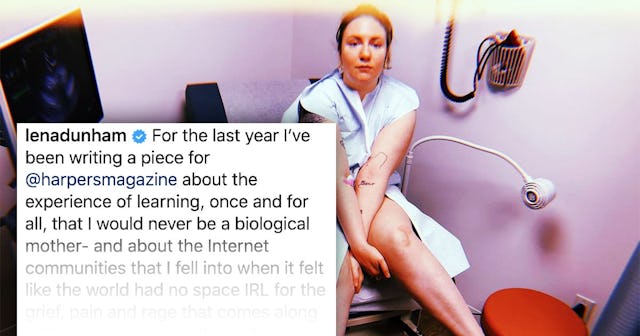Lena Dunham Writes ‘Giving Up On Motherhood’ Essay After Failed IVF Attempt

Lena Dunham reveals she underwent an unsuccessful IVF treatment years after having a hysterectomy
Ask anyone who has struggled with fertility issues and they will tell you it is one of the most difficult experiences imaginable. According to the Centers for Disease Control and Prevention, six percent of women between the ages 15 to 44 are unable to get pregnant after one year of trying, the definition of the term infertility. Additionally, about 12% of women aged 15 to 44 years have difficulty getting pregnant or carrying a pregnancy to term. Girls star and creator Lena Dunham counts herself among that group and penned a powerful and emotional essay on coming to terms with the fact that she “would never be a biological mother.”
RELATED: Looking To Get Down? Here’s What You Need to Know About Sex After A Hysterectomy
Dunham first revealed in 2018 that she underwent a hysterectomy as a result of endometriosis, and in a new essay for Harper’s Magazine she opens up about her fertility struggles, revealing that she has since attempted to harvest her eggs via IVF, before finally accepting that biological motherhood isn’t in the cards for her.
“For the last year I’ve been writing a piece for @harpersmagazine about the experience of learning, once and for all, that I would never be a biological mother — and about the Internet communities that I fell into when it felt like the world had no space IRL for the grief, pain and rage that comes along with processing something of this magnitude,” she wrote on Instagram about her moving memoir-style essay.
“Fertility is a complex topic, one that’s easy to reduce to outdated biological urges and gender roles, baby announcement photos and girl on girl jealousy. The fertility industrial complex is also about financial privilege, the refusal to be perceived as a quitter and (often, not always, shout out to the many queer folks using IVF to change the face of American families) fear of embracing non-normative home structures. But for me — for so many — my turn on the IVF ride was wrapped up in self-hatred, addiction and fear of the unknown — who was I if not a mother?” she continued.
She continued to explain that she decided to write the piece “for the many women who have been failed by both medical science and their own biology, but who have been further failed by society’s inability to imagine another role for them. I also wrote this for the people who dismissed their pain. And I wrote this for the strangers online- some of whom I communicated with, most of whom I did not — who showed me, over and over again, that I was far from alone.”
Her long and poignant essay, or memoir as she suggests, is titled False Labor: Giving Up on Motherhood and painfully describes how, at the age of 31, she underwent her hysterectomy and started searching for an alternative way to become a mother. “I became keenly obsessed with it,” she admits, explaining how she explored adoption, attempted to fill the hole inside of herself by adopting two hairless cats, got into a relationship, went to rehab for an addiction to benzodiazepines, and watched as various friends got pregnant, before joining IVF Warriors, an online community of women struggling with fertility. It was there that she learned there was potential for her to become a biological mother by harvesting her eggs and using a surrogate.
She proceeded to see a fertility doctor who told her she “might have a chance of harvesting eggs” with her remaining ovary. However, after undergoing the arduous egg harvesting process, she “learned that none of my eggs were viable on Memorial Day, in the midst of a global pandemic.”
She explains that wanting to have a child completely took over her life.
“What started as wanting to carry the child of the man I loved became wanting to have a child with a man who was willing to help me have one,” she wrote. “Soon that became hiring a lawyer to draft a contract for a sperm-donor friend and calling a surrogate who came highly recommended by another celebrity. I was forced to admit just how much of it was about finishing what I started. I tried to have a child. Along the way, my body broke. My relationship did, too. In the process — because of it? — I became a functional junkie. I had lost my way, and a half-dozen eggs sitting in Midtown promised to lead me home. Instead, each step took the process further from my body, my family, my reality. Each move was more expensive, more desperate, more lonely. I stopped being able to picture the ending.”
Through it all, she learned a lesson, which ironically, has prepared her for motherhood.
“There is a lot you can correct in life — you can end a relationship, get sober, get serious, say sorry — but you can’t force the universe to give you a baby that your body has told you all along was an impossibility. Weak animals die in the woods as their pack mates run ahead. Bad eggs don’t hatch. You can’t bend nature,” she said in the conclusion. “The irony is that knowing I cannot have a child– my ability to accept that and move on — may be the only reason I deserve to be anyone’s parent at all. I think I finally have something to teach somebody.”
Dunham tells People that she’s “not going to let myself mourn a set of children that weren’t ever mine to begin with,” and said that “whether it’s adoption or foster-to-adopt, I love the idea of becoming a mother in the way that’s right for me, and I’m committed to it.”
This article was originally published on